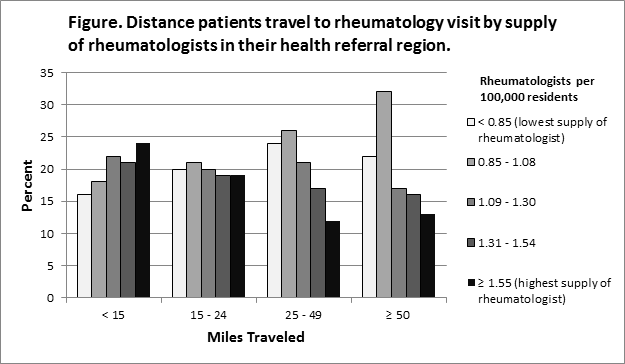Background/Purpose: Workforce shortages in rheumatology have been reported in the face of an aging population and increased number of people gaining insurance under the Affordable Care Act. Population-wide studies of rheumatology supply and the distances that patients travel to see a rheumatologist have not been performed. We used national Medicare data to examine the actual distances patients travel for rheumatology care and hypothesized that patients travelling farthest would reside in low-supply areas.
Methods: Data derive from nationwide Medicare fee-for-service medical claims for 2009 for a 5% random sample of beneficiaries. All patients ≥ age 18 with 12 months of continuous enrollment in Medicare Parts A and B who had at least 1 visit to a rheumatologist were included. We calculated distance between the center of the patient’s 5-digit ZIP code and the center of the rheumatologist’s office 5-digit ZIP code for the first rheumatologist seen during the calendar year. We averaged distances according to health referral regions (HRRs), regional health care markets for tertiary medical care, and compared average distance with the supply of rheumatologists per HRR (publically available data through the Dartmouth Atlas). Individuals from HRRs with fewer than 40 eligible beneficiaries were censored from this analysis to increase the precision of our estimates.
Results: We studied 44,043 Medicare patients who had at least one visit to a rheumatologist during 2009, representing 245 HRRs. Median distance traveled was 9.3 miles (IQR 4-22). 10% of patients travelled ≥50 miles to see a rheumatologist. Of those traveling long distances, 22% resided in an HRR with the lowest supply of rheumatologists (<0.85 per 100,000 residents) but over 25% resided in an HRR in the 2 highest quintiles of supply (> 1.30 per 100,000 residents). When distances were averaged according to HRR, 13 (4%) of HRRs had an average travel distance of ≥50 miles; only 4 of these HRRs had a supply of rheumatologists in the lowest quintile (Figure).
Conclusion: A substantial proportion of patients in the United States travel significant distances to visit a rheumatologist, although a minority of these patients resides in areas with the lowest supply of rheumatologists. These findings are contrary to our original hypothesis that rheumatologist supply is the main reason for long travel distances. Whether factors such as physician participation in health plans, tertiary care referral patterns, and patient preferences affect travel distance will require additional study.
Disclosure:
G. Schmajuk,
None;
C. Tonner,
None;
J. Yazdany,
None.
« Back to 2014 ACR/ARHP Annual Meeting
ACR Meeting Abstracts - https://acrabstracts.org/abstract/relationship-between-rheumatology-physician-supply-and-travel-distances-to-rheumatologists-for-medicare-beneficiaries-in-the-united-states/

